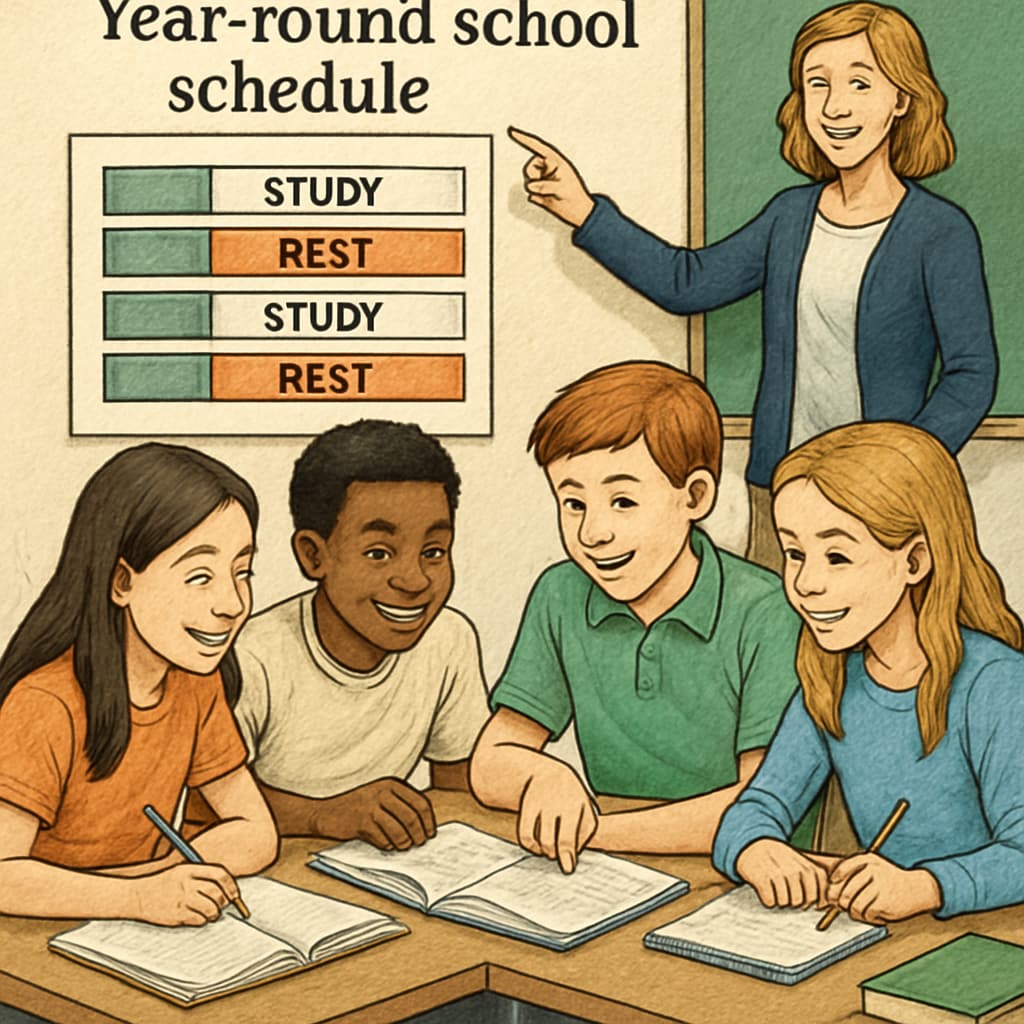Year-round schooling, knowledge retention, and summer break alternatives are increasingly becoming hot topics in educational reform discussions. For decades, the traditional school calendar—with long learning periods followed by extended summer vacations—has been the norm. However, studies have shown that this approach may hinder students’ ability to retain knowledge over time. Could an alternative model, such as year-round schooling with balanced breaks like “one week learning, one week resting,” better support student success? Let’s dive into the potential benefits and challenges of rethinking how we structure our school year.
Why Does Summer Break Impact Knowledge Retention?
Most traditional school systems include a long summer break that lasts up to two or three months. While these breaks offer opportunities for relaxation and extracurricular activities, they often lead to the phenomenon known as “summer learning loss.” According to research from the National Summer Learning Association (Summer Learning Association), students can lose approximately one month’s worth of learning during the summer, particularly in subjects like mathematics and reading.
Extended breaks disrupt the continuity of learning, forcing students to re-learn forgotten concepts when the school year resumes. Teachers often spend valuable classroom time reviewing material instead of progressing to new topics. As a result, the efficiency of traditional education calendars comes into question, prompting educators and policymakers to explore alternative models like year-round schooling.

The Year-Round Schooling Model: How Does It Work?
The concept of year-round schooling is not entirely new but has gained more attention in recent years. This model reimagines the school calendar by redistributing breaks throughout the year. Instead of a single long summer break, students follow a schedule that alternates between shorter periods of learning and resting, such as “one week of study followed by one week off.”
Year-round schooling offers several potential benefits:
- Continuous learning: Shorter breaks reduce the risk of knowledge loss, ensuring students retain more information.
- Improved focus: Alternating between study and rest periods promotes mental rejuvenation, preventing burnout.
- Flexible schedules: Families can plan vacations during off-peak times, reducing costs and crowds.
However, implementing year-round schooling also presents challenges, such as logistical adjustments for teachers, students, and parents. Schools need to update transportation, extracurricular activities, and childcare systems to align with the new calendar.

Does Year-Round Schooling Improve Knowledge Retention?
One of the primary arguments in favor of year-round schooling is its potential to enhance knowledge retention through consistent engagement. By limiting extended breaks, students are less likely to forget critical concepts and skills. A study published in the journal Edutopia highlights that shorter, more frequent breaks can improve cognitive performance by reducing mental fatigue and providing regular opportunities for reflection.
Additionally, year-round schooling supports diverse learning styles. Students struggling with traditional schedules may find the balanced approach more manageable, as it accommodates their need for regular downtime. Teachers also benefit, as they spend less time reviewing old material and more time advancing through the curriculum.
Looking Ahead: The Challenges of Implementation
Despite its advantages, transitioning to a year-round schooling model requires careful planning and resources. Key challenges include:
- Parental adaptation: Families accustomed to traditional school calendars may face difficulties adjusting work and vacation schedules.
- Teacher workload: Educators may need additional training to adapt lesson plans to the new calendar structure.
- Community resistance: Some stakeholders may oppose the change, citing a preference for long summer breaks.
Addressing these obstacles will require collaboration among schools, families, and policymakers to ensure the year-round model is implemented successfully.
Conclusion: Time to Rethink the School Calendar?
Year-round schooling offers a promising solution to the challenges posed by traditional calendars, particularly in mitigating knowledge loss and improving learning outcomes. While the idea of “one week study, one week rest” may seem unconventional, it aligns with educational research emphasizing the importance of balanced learning schedules. By rethinking how we structure the academic year, we can pave the way for a more effective and sustainable education system.
As the conversation around year-round schooling evolves, it’s crucial to weigh the benefits and challenges to determine whether this model truly meets the needs of modern students and educators. Could this be the future of education?
Readability guidance: This article uses short paragraphs, clear transitions, and concise language to maximize readability. Lists and examples are included to break down complex ideas and ensure the content is digestible for a wide audience.


